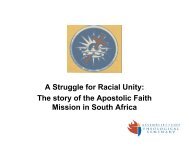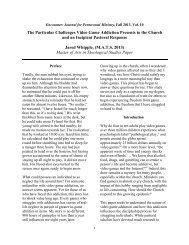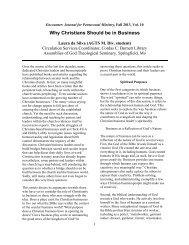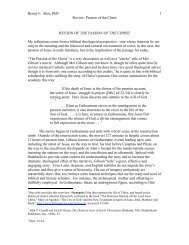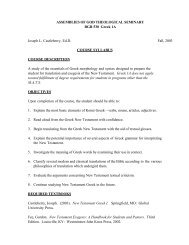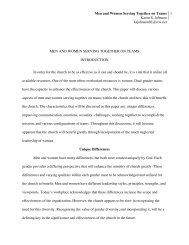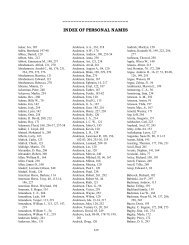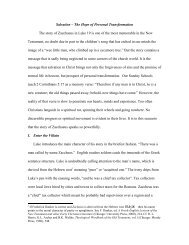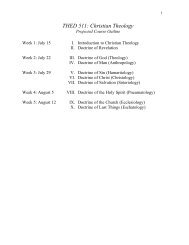Encounter: Journal for Pentecostal Ministry - Assemblies of God ...
Encounter: Journal for Pentecostal Ministry - Assemblies of God ...
Encounter: Journal for Pentecostal Ministry - Assemblies of God ...
Create successful ePaper yourself
Turn your PDF publications into a flip-book with our unique Google optimized e-Paper software.
have a special interest directed toward the<br />
marginalized and wants to make sure they<br />
are cared <strong>for</strong>. Frank Thielman concludes,<br />
“<strong>God</strong>‟s saving purposes involve, to some<br />
extent, an economic leveling so that the<br />
disparity between rich and poor is not as<br />
great among <strong>God</strong>‟s people as it is among<br />
those outside his people.” 48 These saving<br />
purposes can be accomplished through the<br />
giving <strong>of</strong> wealth to the poor as seen later in<br />
Luke‟s Gospel. 49 Equality and the<br />
discouragement <strong>of</strong> favoritism toward the<br />
rich seem to be the key issues. Salvation<br />
through Christ is not dependent on the<br />
economic status <strong>of</strong> an individual. Giving to<br />
the poor and to the causes <strong>of</strong> Christ rather<br />
than living a life <strong>of</strong> greed will accomplish<br />
Christ‟s purposes in significant ways.<br />
Luke provides an excellent example <strong>of</strong> this<br />
concept in the “parable <strong>of</strong> the rich fool”:<br />
And he told them this<br />
parable: The ground <strong>of</strong> a<br />
certain rich man produced a<br />
good crop. He thought to<br />
himself, „What shall I do? I<br />
have no place to store my<br />
crops.‟ Then he said, „This is<br />
what I‟ll do. I will tear down<br />
my barns and build bigger<br />
ones, and there I will store all<br />
my grain and my goods. And<br />
I‟ll say to myself, You have<br />
plenty <strong>of</strong> good things laid up<br />
<strong>for</strong> many years. Take life<br />
easy; eat, drink and be<br />
merry.‟ But <strong>God</strong> said to him,<br />
„You fool! This very night<br />
your life will be demanded<br />
from you. Then who will get<br />
what you have prepared <strong>for</strong><br />
yourself?‟ This is how it will<br />
be with anyone who stores up<br />
things <strong>for</strong> himself but is not<br />
8<br />
rich toward <strong>God</strong>. (Luke<br />
12:16-21)<br />
This parable clearly reveals Jesus‟<br />
assessment <strong>of</strong> greed. This “fool” had not<br />
given to the poor, which hindered him from<br />
becoming “rich towards <strong>God</strong>.” 50 He instead<br />
stored up <strong>for</strong> himself. 51 The parable is taught<br />
in relation to the earlier matter <strong>of</strong> dealing<br />
with possessions in verses 13-15 in the same<br />
chapter. 52 In verse 33, Jesus states, “Sell<br />
your possessions and give to the poor.<br />
Provide purses <strong>for</strong> yourselves that will not<br />
wear out, a treasure in heaven that will not<br />
be exhausted, where no thief comes near and<br />
no moth destroys.” This verse might confirm<br />
Luke‟s particular emphasis on almsgiving,<br />
especially when seen in relation to the<br />
counterpart in Matthew 6:19-21. 53 By giving<br />
to the poor rather than hoarding one‟s<br />
wealth, the believer can further the cause <strong>of</strong><br />
the kingdom and become “rich toward<br />
<strong>God</strong>.”<br />
Jesus, while at the home <strong>of</strong> a Pharisee,<br />
emphasizes the importance <strong>of</strong> humbling<br />
oneself (Luke 14). Jesus implores the host to<br />
invite the poor to dinner rather than the “rich<br />
neighbors” who are fully capable <strong>of</strong><br />
repayment (vs. 12-14). Jesus states, “…and<br />
you will be blessed. Although they cannot<br />
repay you, you will be repaid at the<br />
resurrection <strong>of</strong> the righteous.” Jesus clearly<br />
confirms that blessing the poor results in<br />
heavenly blessings. Pilgrim asserts that the<br />
inclusion <strong>of</strong> “rich neighbors” at the<br />
beginning <strong>of</strong> the parable perhaps alludes to<br />
certain actions directed at creating relations<br />
in order to gain selfish favors or<br />
advantages. 54 Although this behavior would<br />
be considered normal, Jesus “turns the norm<br />
upside down” by defining the normalcy <strong>of</strong><br />
the Kingdom: inviting those who cannot<br />
repay, give no advantage, and would<br />
ultimately be a constant burden. 55 The<br />
reward <strong>of</strong> exhibiting this agape-love to the



